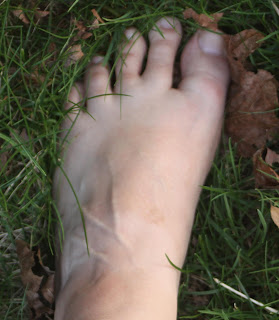I am currently suffering a bout of a chronic condition called Vernal Encephalopathy. I wanted to bring this to attention on this blog since gardeners are particularly susceptible to this surprisingly common malady. This condition is one that seems to go into remission but re-emerges when outdoor temperatures warm up. It can also be brought on by winter vacations to warmer climates. The cause is unknown and there is no cure but treatments do exist.
Symptoms of Vernal Encephalopathy include a brownish or blackish discoloration under fingernails and around nail beds, a reddish flush on the skin, a tenancy to wear clothes that are lighter weight that appropriate for the given time of year, aching muscles and an inability to concentrate.
Wearing gloves will minimize the brownish discoloration around the nails but even so nails seem to be more prone to breaking and chipping than when the sufferer is in remission.
Nail beds of Patient D. Notice particularly the discoloration around the ring finger nail bed. Patient D suffers from severe restlessness when in an indoor setting and had to be evaluated out of doors.
The reddish flush to the skin does not occur in all patients. Caucasians and Asians are more likely to display this symptom than other races. There is some evidence to suggest that the use of certain types of lotions reduces this symptom but the data are still incomplete. Some patients experience this red flush to a great degree and others seem to have a milder version that often fades to an overall tan tint to the skin. The flush is usually localized to the face and extremities of patients, with the core of the body retaining its normal coloration.
Discoloration of the skin in Patient D. Notice that this patient has a more tan colored discoloration on the top of the foot rather than the reddish flush. Based on oral history Patient D does not tend to get the reddish flush but goes straight to a tan color on the extremities. Patient D self reports that the unusual pattern of discoloration is typical and seems to persist through much of the year.
Patients often come in to the physicians office wearing short sleeves, shorts and even sandals despite the calendar indicating the month is April (a common month for an outbreak of Vernal Encephalopathy). Patient temperatures remain at or near normal levels. Some Doctors speculate that sufferers are prone to periodic fevers that cause them to dress inappropriately but there is no evidence to support this hypothesis.
The symptom of aching muscles can be minimized by a regular routine of exercise and regular stretching. Individuals who exercise more during the winter months are less likely to experience this symptom and when they do experience this symptom it is less severe than for individuals who have not been exercising.
The inability of the patient to concentrate fully is a great detriment to workplace productivity. Even worse, one individual experiencing an outbreak of Vernal Encephalopathy can often cause other workers to come out of remission and suffer their own outbreak. Severe outbreaks can also result in increased sick leave as patients must stay home to treat their symptoms. In severe cases the patient also reports a feeling of restlessness, as if the walls of the workplace are closing in. Taking sick leave is the only treatment for this symptom.
While there is no cure for Vernal Encephalopathy most patients do experience remission of symptoms during cooler weather and after acclimating to warmer weather. Treatment with higher than normal dosages of Vitamin D seems to help with the condition. Oddly oral doses of Vitamin D do not seem to have an effect. The patient must get sun exposure so that their body can naturally produce Vitamin D.
Some individuals report that too much sun exposure increases Vitamin D to a near toxic level, resulting in a sense of euphoria. This can be addictive so sun exposure should be carefully limited.
A naturalistic treatment outside of mainstream medicine that is rumored to help sufferers deal with their outbreaks involves exposure to common garden dirt. It is unclear what, if anything, in the soil is helping the patients. Mainstream medicine scoffs at this treatment but many patients have reported a great relief, particularly of their mental and psychological symptoms.
Research is ongoing but it turns out that many of the researchers have contracted Vernal Encephalopathy themselves. This is making progress slow and difficult since not only do they experience flare-ups of symptoms at the same time as other patients but exposure to individuals suffering an outbreak will induce an outbreak in the researcher, leading to a decreased ability to concentrate and a high rate of absences as the researchers self-medicate.
Donations to the cause can be made to Bluestone Perennials. Be sure to mention Garden on the Edge on your donation form so I can use the donations to buy plants get a non-profit status for my advocacy work.
Thank you for caring.


(Rolling on the floor laughing my ass off!)
ReplyDeleteLove it!
ReplyDeleteWait, WHAT?! Was that supposed to be a joke?!! WEird!
ReplyDelete